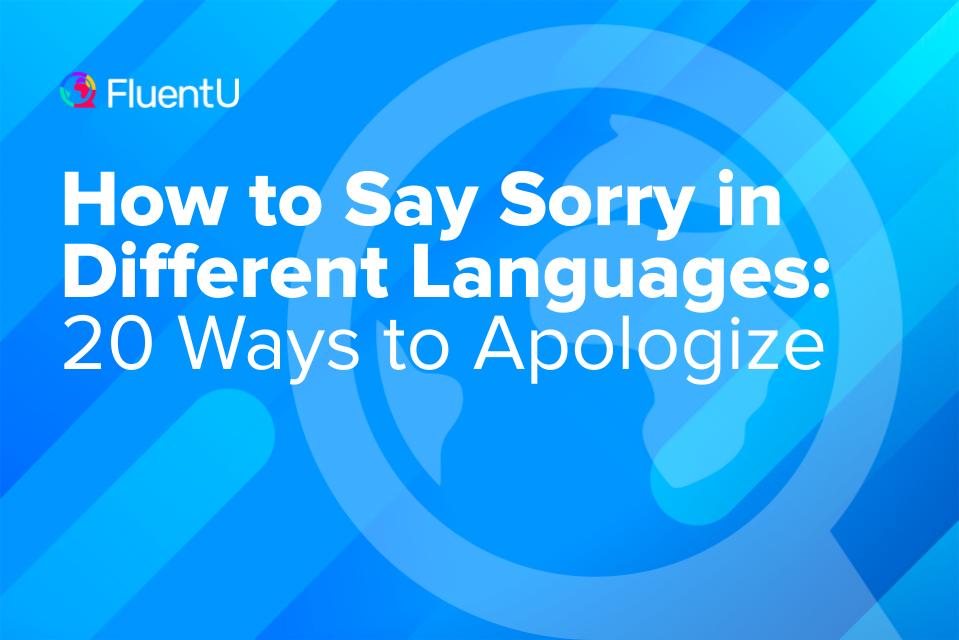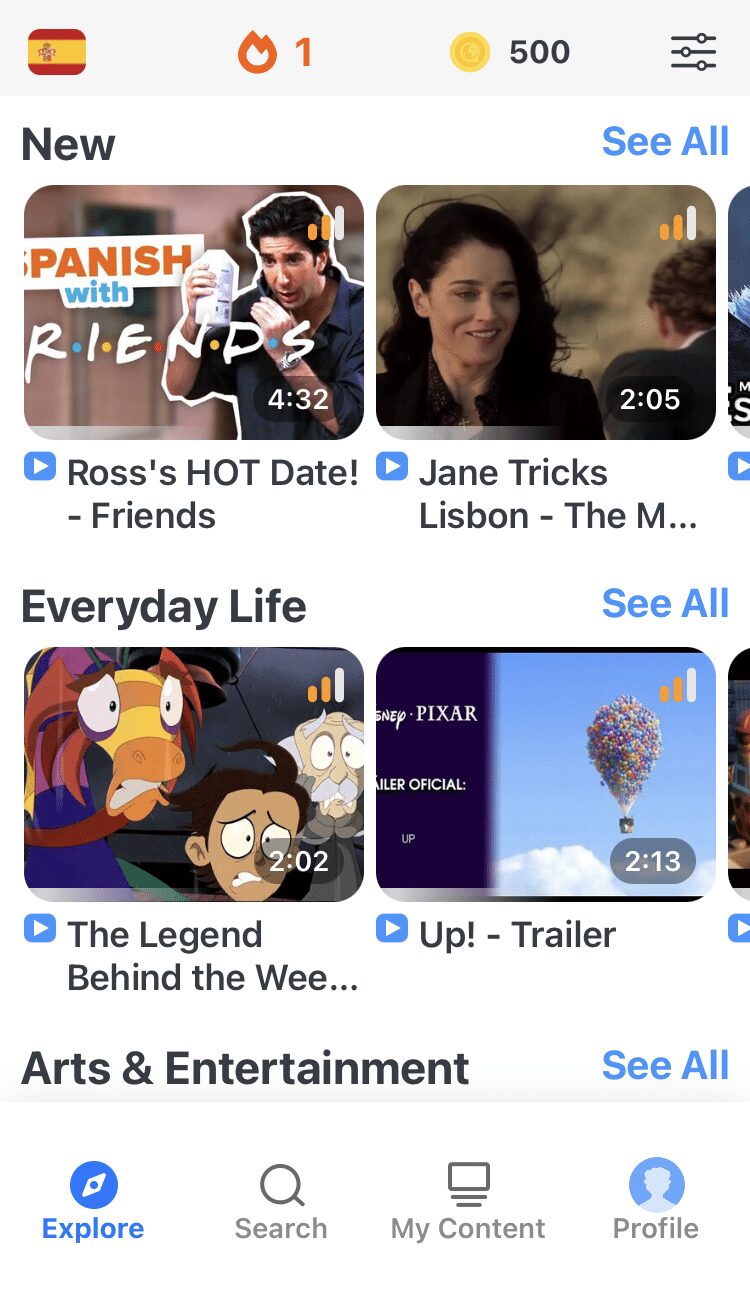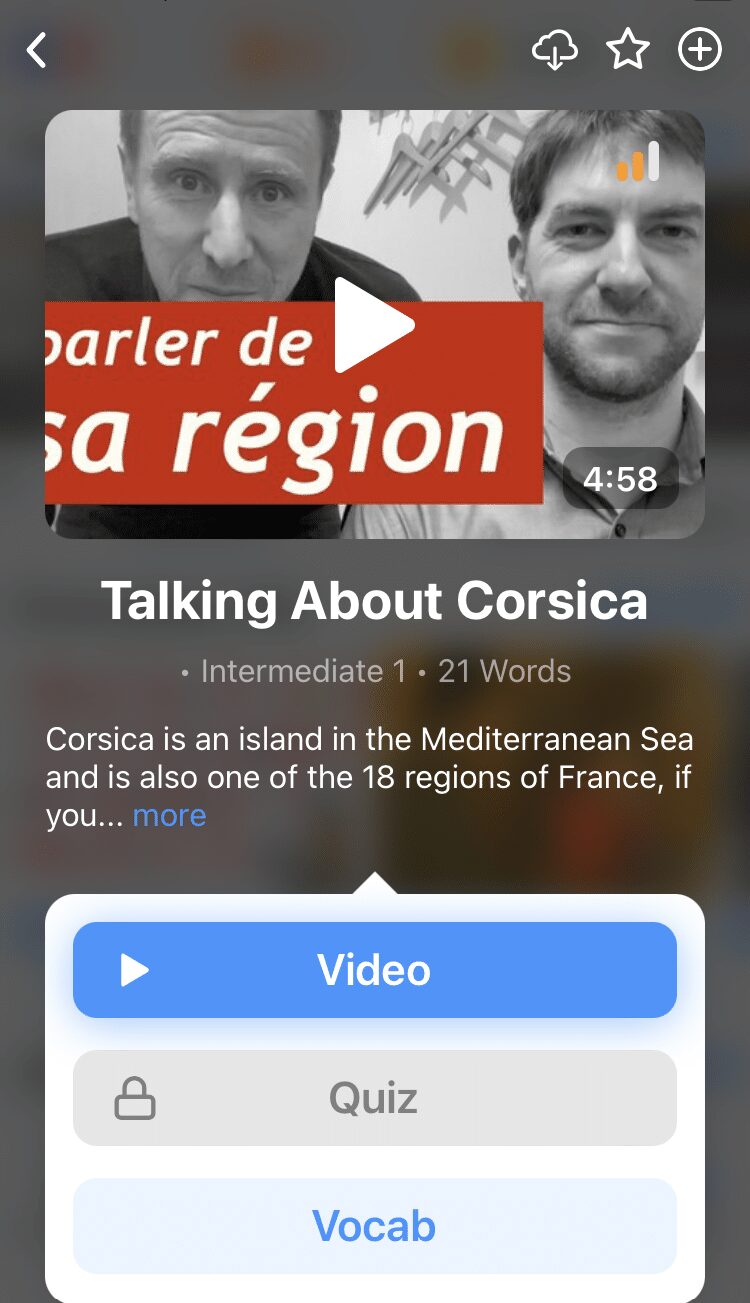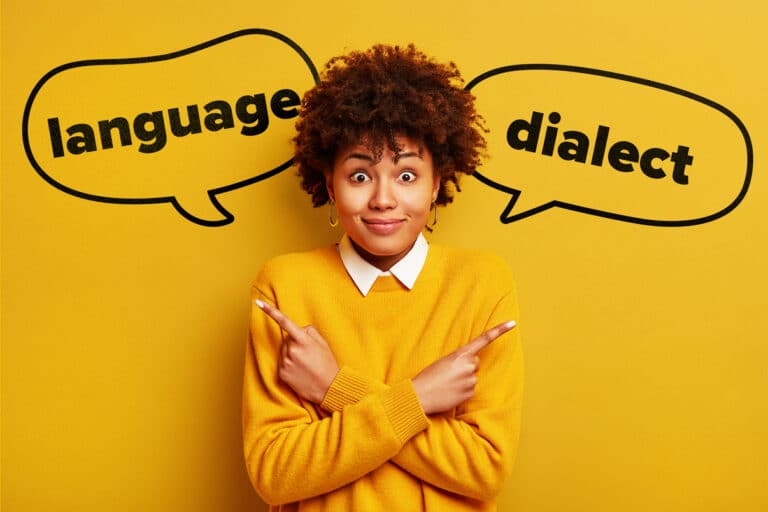Contents
- 20 Ways to Say Sorry in Different Languages
- 1. Afrikaans: Jammer
- 2. Arabic: آسف (Aasif)
- 3. Bosnian: Oprostite
- 4. Chinese: 对不起 (Duì bù qǐ)
- 5. Czech: Promiňte
- 6. Danish: Undskyld
- 7. Dutch: Het spijt me
- 8. Finnish: Anteeksi
- 9. French: Désolé (Masculine); Désolée (Feminine)
- 10. German: Es tut mir leid
- 11. Greek: συγνώμη (Signómi)
- 12. Hungarian: Sajnálom
- 13. Icelandic: Fyrirgefðu
- 14. Italian: Mi dispiace
- 15. Japanese: すみません (Sumimasen)
- 16. Korean: 미안합니다 (Mianhamnida); 죄송합니다 (Joesonghamnida)
- 17. Norwegian: Beklager
- 18. Portuguese: Sinto muito
- 19. Russian: извини (Izveni); извините (Izvinite)
- 20. Spanish: Lo siento
- How Different Cultures View Apologies
- And One More Thing...
How to Say Sorry in Different Languages: 20 Ways to Apologize

Let’s face it: We’ve all made mistakes and have been in a position where we need to offer an apology. Plus, saying sorry is just part of politeness.
But even those with huge vocabularies struggle to find just the right words to express regret. So it’s a good idea to figure out how to say sorry in the language(s) you’re learning.
In this guide, I’ll show you how to say sorry in 20 different languages from around the world, from languages including Chinese, Spanish, Japanese and more.
Download: This blog post is available as a convenient and portable PDF that you can take anywhere. Click here to get a copy. (Download)
20 Ways to Say Sorry in Different Languages
1. Afrikaans: Jammer
Afrikaans is spoken in South Africa, Namibia, Zimbabwe and Botswana.
2. Arabic: آسف (Aasif)
A large number of countries—25, at least!—use Arabic as their official language, so grabbing this language’s “I’m sorry” might come in handy!
3. Bosnian: Oprostite
Bosnian is spoken not only in Bosnia and Herzegovina, but also in Serbia, Croatia and Montenegro.
4. Chinese: 对不起 (Duì bù qǐ)
Chinese is one of the official languages of the United Nations, along with Russian, Arabic, English, French and Spanish. It’s believed that approximately 1.3 billion people speak some form of Chinese as their native language!
5. Czech: Promiňte
Czech is the official language of the Czech Republic and is spoken by more than 10 million people.
When I spent time in Prague, I was able to listen to a lot of people speak this language. It’s very lyrical—and my new friends assured me it’s an easy language to learn. But of course, it could just seem easy to them since Czech is their native language.
6. Danish: Undskyld
Danish is spoken not only in Denmark but also in many other countries. Included in the global spots where this melodious language is spoken are Norway, Iceland, Germany and Greenland, to name just a few.
If you find yourself running late in a Danish-speaking country, “Undskyld, jeg kommer for sent” (“Sorry, I’m late”) will get you off the hook!
7. Dutch: Het spijt me
Dutch is a widely spoken language, with 23 million calling it their mother tongue.
It’s spoken in the Netherlands, but did you realize it’s also spoken in Suriname (in South America) and parts of the Caribbean?
8. Finnish: Anteeksi
Finnish is one of the two official languages of Finland (Swedish being the second!).
I picked up a fun bit of trivia about Finnish language learners when I visited Finland. It’s said that many people learn the language because of music. That’s right, Finland is well known for its heavy metal bands. Apparently many music lovers hop on the Finnish language train in order to better understand songs by these bands—which are often sung in, you guessed it, Finnish!
9. French: Désolé (Masculine); Désolée (Feminine)
French is a beautiful language, even when there’s only a one-word apology being offered.
Don’t use the apology, though, if you’re trying to ask for information or get through a crowd. In that case, say excusez-moi (excuse me) instead!
10. German: Es tut mir leid
German is an official language in six countries: Germany, Liechtenstein, Switzerland, Luxembourg, Austria and Belgium!
11. Greek: συγνώμη (Signómi)
If you’re an English speaker saying συγνώμη (signómi) in Athens, you might receive a smile of acceptance just before you’re offered a taste of freshly baked baklava. This is something I personally know can happen—my mouth still waters when I recall the delicious, sweet pastry I was served after apologizing for a mishap with my water glass at a sidewalk café!
12. Hungarian: Sajnálom
Nearly 10 million citizens of Hungary call this lovely language their native tongue!
13. Icelandic: Fyrirgefðu
Saying “I’m sorry” in Icelandic is, as noted above, not something that’s overdone. But, when it’s absolutely necessary, fyrirgefðu works just fine!
14. Italian: Mi dispiace
Mi dispiace is the Italian phrase that’s generally accepted to convey an apology, but it’s more common to hear scusi (sorry). Unless the offense is truly epic, scusi will most likely do the job!
15. Japanese: すみません (Sumimasen)
As noted above, there are many ways to express regret or offer an apology in Japanese. すみません (Sumimasen) translates into “excuse me” but is accepted as a nice way to smooth things over.
16. Korean: 미안합니다 (Mianhamnida); 죄송합니다 (Joesonghamnida)
미안합니다 (mianhamnida) is used in more casual situations, whereas 죄송합니다 (joesonghamnida) is more polite and thus, used more often.
17. Norwegian: Beklager
Norwegian is the official language of Norway—a magical spot where, if you’re inclined to visit, you just might see the Northern Lights! I did see the Lights when I was there and believe me, there’s nothing to be sorry about when you have that kind of adventure!
18. Portuguese: Sinto muito
Portuguese is a widely spoken language that boasts over 279 million speakers!
19. Russian: извини (Izveni); извините (Izvinite)
Over 265 million people speak Russian, which is the official language of Kazakhstan, Kyrgyzstan, Belarus and, of course, Russia.
извините (izvinite) is used in formal situations, and the word прости (prosti) is commonly used as well. The formal version of this word is простите (prostite).
20. Spanish: Lo siento
Often mucho (much) is attached to the end of this phrase, turning it into the more meaningful lo siento mucho (I’m very sorry).
Perdón (literally means “pardon”) is the word used to ask for an apology in Spanish.
If you want to hear “I’m sorry” spoken in more languages, check out this great video on YouTube. It’ll definitely help language learners with pronouncing many of the apologetic phrases!
How Different Cultures View Apologies
Even though different cultures handle apologies in their own ways, it’s safe to say that “I’m sorry” is typically said after you’ve made a mistake. However, many cultures also use it after there’s been a misunderstanding or, if a friend or acquaintance is experiencing a difficult or unfortunate life event, to express your condolences.
For example, if a colleague tells you that her mother has recently passed away, you’d typically respond with “I’m sorry for your loss,” or something similar.
It can also express regret over missing an occasion or as a way to atone for lateness.
That’s right, apologies and saying sorry can be a difficult cultural component to describe. The video below shows just how many different ways of expressing this simple three-word sentiment there are in English!
Sometimes an apology is accompanied by a gift. For example, when apologizing in Brazil, the person who says “I’m sorry” often gives the offended party a small gift along with a note.
In Japanese culture, politeness seems almost elevated. There are many ways to say “I’m sorry”—some of which are offered with accompanying hand gestures.
Iceland, with its gorgeous glaciers and super friendly citizens, isn’t a global hotspot for apologies. Their word for “I’m sorry” is used more frequently to indicate, by the tone of their voice, whether their intent is a heartfelt “excuse me” or just a conversation filling phrase.
If you want to hear the phrase in context as actual native speakers would use it (for several different languages!), you can use a program such as FluentU.
FluentU takes authentic videos—like music videos, movie trailers, news and inspiring talks—and turns them into personalized language learning lessons.
You can try FluentU for free for 2 weeks. Check out the website or download the iOS app or Android app.
P.S. Click here to take advantage of our current sale! (Expires at the end of this month.)
Use these “I’m sorry” expressions to make amends, smooth things over or accept guilt for an error made.
So if you make a mistake? Express an apology with ease, now that all the relevant words and phrases are in your skillset.
And if you’re learning to speak more than one language? We’ve still got you covered!
Your foreign companions will appreciate your effort to be polite—in any language!
Download: This blog post is available as a convenient and portable PDF that you can take anywhere. Click here to get a copy. (Download)
And One More Thing...
If you dig the idea of learning on your own time from the comfort of your smart device with real-life authentic language content, you'll love using FluentU.
With FluentU, you'll learn real languages—as they're spoken by native speakers. FluentU has a wide variety of videos as you can see here:
FluentU has interactive captions that let you tap on any word to see an image, definition, audio and useful examples. Now native language content is within reach with interactive transcripts.
Didn't catch something? Go back and listen again. Missed a word? Hover your mouse over the subtitles to instantly view definitions.
You can learn all the vocabulary in any video with FluentU's "learn mode." Swipe left or right to see more examples for the word you’re learning.
And FluentU always keeps track of vocabulary that you’re learning. It gives you extra practice with difficult words—and reminds you when it’s time to review what you’ve learned. You get a truly personalized experience.
Start using the FluentU website on your computer or tablet or, better yet, download the FluentU app from the iTunes or Google Play store. Click here to take advantage of our current sale! (Expires at the end of this month.)









